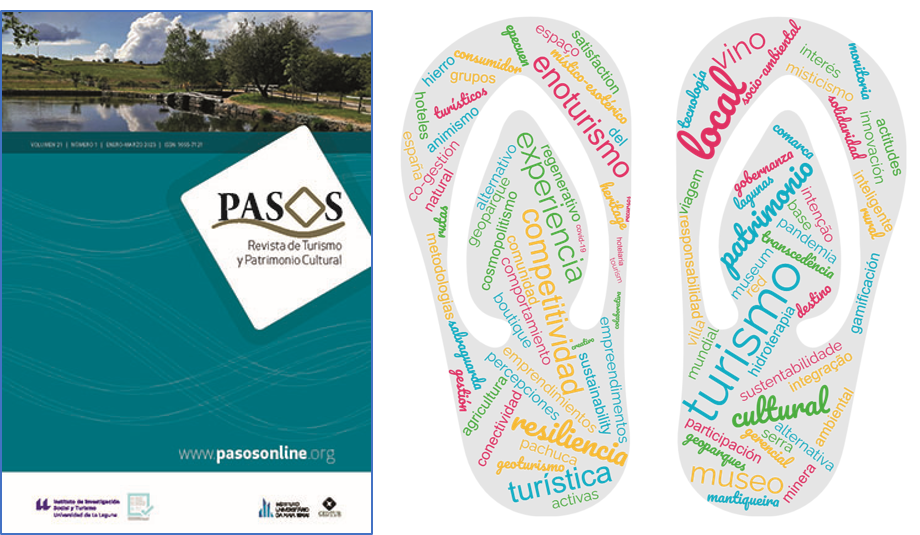Turismo de base local. Resiliencia, alternativa socio-ambiental y comunidad. Ruiz-Ballesteros, E. (Ed.)
DOI:
https://doi.org/10.25145/j.pasos.2023.21.016Palavras-chave:
alternativa socio-ambiental, comunidad, resiliencia, turismo de base localResumo
El turismo de base local es concebido como una herramienta para propiciar el desarrollo local y la conservación ambiental bajo el paraguas de un modelo turístico controlado y gestionado por las poblaciones locales de los lugares en los que se lleva a cabo. El libro aquí reseñado presenta un abordaje antropológico de las particularidades de este modelo a través de la compilación de estudios de caso en Latinoamérica y España, analizados longitudinalmente por especialistas y enlazados a través de tres enfoques interrelacionados: resiliencia, comunidad y alternativa socio-ambiental. Una reflexión inductiva con un hilo analítico argumentativo con suficiente claridad y precisión que facilita su comprensión al lector, especializado o no, proporcionando una perspectiva teórica general de los fenómenos y procesos involucrados en el turismo de base local, al tiempo que permite ahondar en las especificidades propias de cada estudio de caso.
Downloads
##plugins.generic.pfl.publicationFactsTitle##
##plugins.generic.pfl.reviewerProfiles## Indisp.
##plugins.generic.pfl.authorStatements##
##plugins.generic.pfl.indexedIn##
-
##plugins.generic.pfl.indexedList##
- ##plugins.generic.pfl.academicSociety##
- PASOS. Revista de Turismo y Patrimonio Cultural
- ##plugins.generic.pfl.publisher##
- Instituto Universitario de Investigación Social y Turismo. Universidad de La Laguna (España) - Instituto Universitario da Maia ISMAI (Portugal)
Referências
Butler, R. 1994. Alternative tourist; the thin edge of the wedge. In V. Smith, & W. Eadington (Eds.), Alternatives tourism. (pp. 31-46) Chichester: John Wiley & sons.
Cáceres-Feria, R. y Ruiz-Ballesteros, E. 2021. Entre forasteros y locales: turismo de base local y contrucciónde comunidad. En E. Ruiz-Ballesteros (Ed.), Turismo de base local. Resiliencia, alternativa socio-ambiental y comunidad. Ed. Icaria
Escalera-Reyes, J. y Ruiz-Ballesteros, E. 2011. Resiliencia Socioecológica: aportaciones y retos desde la Antropología, Revista de Antropología Social, 20:109-135. https://doi.org/10.5209/rev_RASO.2011.v20.36264
Gascón, J. y Milano, C. 2017. El turismo en el mundo rural ¿Ruina o consolidación de las sociedades campesinas e indígenas?. Tenerife: PASOS Edita
Goodwin, H. y Santilli, R. 2009. Community based tourism: A success?, ICRT Occasional Paper, 11: 1-37.
Holling, C.S. 2001. Understanding the coplexity of economic, ecological and social systems, Ecosystems, 4(5): 390-405.
MacCannell, D. 2003. El turista, una nueva clase ociosa. Barcelona: melusina.
Martínez Álvarez, B. y Cortés Vázquez, J.A. 2021. Turismo y resiliencia socio-ecológica desde la perspectiva de la economía moral. En E. Ruiz-Ballesteros (Ed.), Turismo de base local. Resiliencia, alternativa socio-ambiental y comunidad. Ed. Icaria
Ramos-Ballesteros, P. y Ruiz-Ballesteros, E. 2021. Cuidados y turismo comunitario. En E. Ruiz-Ballesteros (Ed.), Turismo de base local. Resiliencia, alternativa socio-ambiental y comunidad. Ed. Icaria
Ruiz Ballesteros, E. 2017. Claves del turismo de base local. Gazeta de Antropología, 33(1): art. 00
Ruiz-Ballesteros, E. y Cáceres-Feria, R. 2016. Community-building and amenity migration in community-based tourism development. An approach from southwest Spain, Tourism Management, 54: 513-523. https://doi.org/10.1016/j.tourman.2016.01.008
Ruiz-Ballesteros, E. y del Campo Tejedor, A. 2021. Participación comunitaria y diversificación económica: hacia estrategias resilientes en el turismo de base local. En E. Ruiz-Ballesteros (Ed.), Turismo de base local. Resiliencia, alternativa socio-ambiental y comunidad. Ed. Icaria
Ruiz-Ballesteros, E.; Hernández, M. 2010. Tourism that Empowers?, Crit. Anthropol., 30: 201–229
Santana, A., Díaz, P. y Rodríguez, A.J. 2010. Las nuevas formas de turismo: causas y características, Brazilian Journal of Tourism Research, 4(3): 54-70.
Scott, J.C. 1976. The Moral Economy of the Peasant: Rebelion and Subsistence in Southest Asia. New Haven & London: Yale University Press.
Smith, V.L. & Eadintong, W. 1997. Tourism alternatives. Chichester (UK): John Wiley&Sons
Temple, D. 2003. Teoría de la reciprocidad. La Paz: dep-gtz
Downloads
Publicado
Como Citar
Edição
Seção
Licença
Copyright (c) 2022 Pablo Díaz Rodríguez

Este trabalho está licenciado sob uma licença Creative Commons Attribution-NonCommercial-NoDerivatives 4.0 International License.
Confirmo que o trabalho é original (de minha/nossa autoria), e que não será submetido a outras revistas ou publicações até a resolução final do processo de revisão em PASOS, RTPC.
Autorizo a publicação do meu trabalho por PASOS, PSTN de acesso livre e aberto em qualquer dos formatos que considere oportuno, por tempo indeterminado e como colaboração não remunerada.
Da mesma forma, o(s) autor(es) entende(m) que o trabalho publicado pode ser vinculado ou depositado em qualquer servidor ou incluído em outras publicações (republicação), desde que o novo local e/ou a nova edição façam referência à publicação original e reconheçam a autoria e propriedade de direitos autorais das publicações PASOS RTPC.
Os autores entendem que uma verificação de plágio autoplágio será realizada, e o artigo poderá ser removido a qualquer momento do fluxo editorial.










